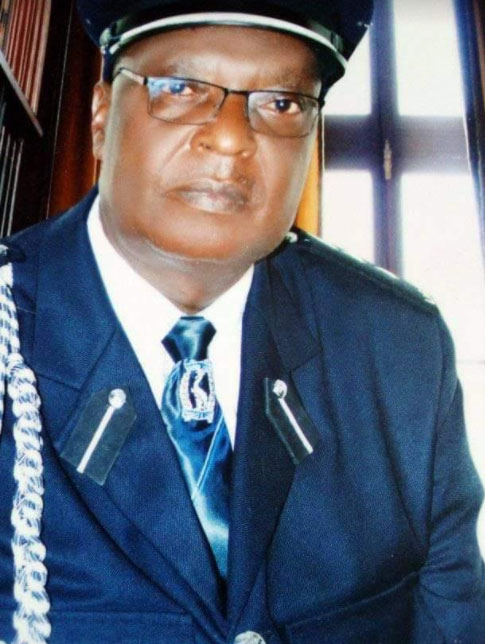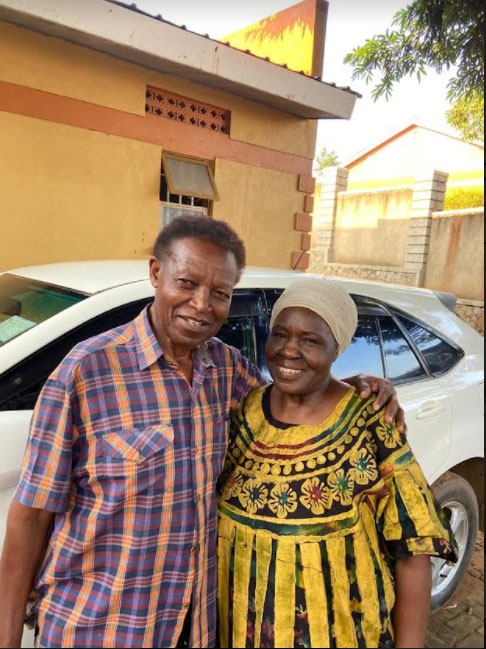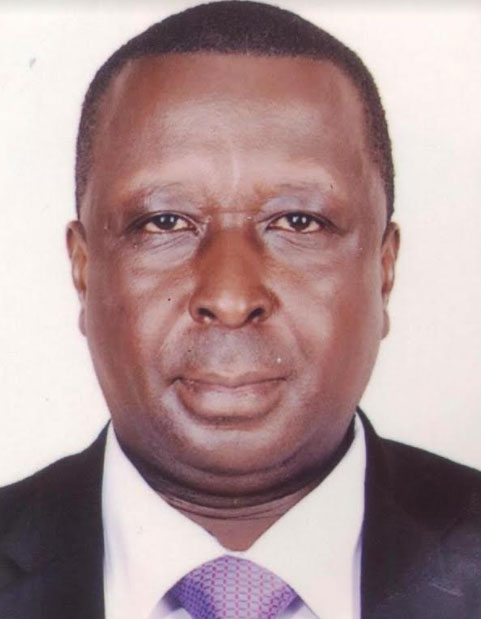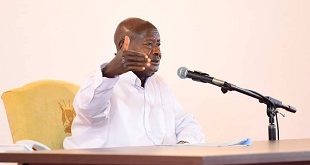
Bernard ‘Sisye’ Kirya and myself were excited by Manjasi Headteacher Keith Mutengu’s 1975 Independence Day offer of “Entambula” and Cakes
OBITUARY | Alfred Geresom Musamali | Bernard Kirya (Sisye) and myself were among the most excited Senior One (S1) students when at the morning assembly of Wednesday 8th October, 1975, our headteacher Keith D. B. Mutengu announced that every student was going to receive a tumbler and a cake. Uganda became independent on 9th October, 1962 and we were marking the 13th anniversary. Mutengu, whom we called ‘Young Man’ by virtue of his constant reference to us as Young Men (the school only became co-educational around 2004), was addressing us just before those who chose to go home for the long Independence weekend could do so.
The excitement did not permit us to listen to Young Man’s remaining guidance on the distribution of the Independence Day gifts but, on hindsight, he implied that that was going to be the last time the school was taking responsibility for availing students with some nitty gritty requirements and that we had to henceforth learn to be more responsible for our own welfare. To us, especially S1s (also often derogatively refered to as niongos or injugas) the word “tumbler” sounded like the Luganda word “entambula” meaning transport so fellow niongos or injugas who were travelling home for Independence thought that Young Man was offering them free transport. As for the cake, it was the first time we were hearing that Young Man could even serve us that type of delicacy.
When we entered S1, we found Manjasi student welfare worse than that in neibouring Tororo Girls’ School but still good enough
When we entered Senior One (S1) in January of that year, the school, located down the slope as you head from Tororo town to Malaba on the Uganda-Kenya border, had a feeding programme rated by many degrees worse than that of our sisters in Tororo Girls School (TGS). Built as an Independence donation from the the United States Agency for International Development (USAID) in the mid-1960s, the girls’ school was on the same side of the Malaba Highway but mainly seperated from Manjasi by a murram road to the town water works and an unbreachable chain link fence. However, they were still swimming in carrots, milk, butter, fish and chicken while we were not. And that, in a country and at a time when females were still discourged from eating chicken, eggs and fish.
Our feeding was also allegedly by a few degrees unmatchable compared to what our brothers in St. Peters College, Tororo, with whom we faught perpetual battles for the TGS, had. Nevertheless, we still had good feeding compared to what some of us, coming from Kisoko Boarding Primary (now Kisoko High) School, had ever dreamt of. Served after the first two periods of classwork which started at 7am, breakfast was porridge (with sugar) and, two or three times a week, a piece of bread shared among four persons.
May be we called the bread “Bantam” because when sliced into the four pieces each piece had the same shape as the Bantam Books some voracious lovers of fiction stocked in their metalic suitcases. They often carried them into class and read from under the table while Fred Hiire Hanyiga laboured away at teaching mathematics.
Today, though, the online dictionary tells me that in sports, the expression refers to “an age level of between 13 and 15 in amateur hockey,” a game non-existent in the school. The dictionary also says that in American English the name applies to something, especially chicken, that is “miniature, small, petite, wee, pygmy, Lilliputian” chicken yet our bread could not be accused of being small. Now, talk about chicken – we had a small poultry unit from which we were fed boiled eggs once a week. We then had a tea during break after the fifth period, served in clear glass cups which had since our arrival been becoming fewer and fewer, either out of breakage, carrying to the dormitory and forgetting to return (eventually taking home at the end of the term) or outright theft.

Lunch was almost always posho (Ugandan English for mingled maize meal) and beans (assuredly with a few weevils to contribute to the protein content, of course!) while there was another cup of tea in the evening before our going for games and sports.
Supper, usually sweat potatoes, cassava, Kibimba (rice, so called because we assumed it all came from that Chinese farm on the Tororo-Kampala Rd) or matooke (bananas) with the weeviled beans (although there was beef on Saturdays), was at 6pm – not a usual hour for chaps used to eating at 8pm when at home! We, the niongos or injugas, never noticed any shortage of plates at lunch time because we queued ahead of the other classes. But during supper the shortage meant that we had to stay in the queue for long into prep time while the cooks, under the supervision of caterer Andrew Kaboole (RIP), collected from the tables those that had been already used by the seniors, washed them and brought them dripping with water for us to re-use.
The welfare state still extended to other personal needs too. For instance, during my first week in the school I remember getting two rolls of toilet tissue and a bar of washing Kisumuluzo (Key) branded soap. Grumbles from some quarters indicated that we ought to have also been given bathing soap but to us that was no big deal as we could use Kisumuluzo for dual purpose and, in any case, washing and bathing were (at least to me!) just luxuries. Later in the year, we were supposed to be issued with two sets of school uniforms. Exercise books were also provided and, being in a technical secondary school, we had enough supply of specialised paper for technical drawing, timber for woodwork and iron or steel for metal work. In the games and sports arena, too, we had no shortage of footballs, volleyballs, basketballs, ring tennis balls (or whatever they are called) and even table tennis balls. Yet for the tuition, feeding, uniforms and laxaries, we paid Uganda Shillings Six Hundred Fifty Only (UGX650) per year. To work out the value appropriately, I should perhaps explain that a kilogramme of beef at the butcher’s was UGX3.
Then Idi Amin’s Economic War Started Biting
But Idi Amin Dada’s Economic War was beginning to bite hard everywhere and Manjasi High School was no exception. That year, the rate of changing for the worst received an unprecedented acceleration. By end of the first term, the bantams, eggs and beef had been knocked off the diet. We hardly went through second term when Kibimba and matooke were not only knocked off but the weevils were mixed in increasing proportions with the beans. Then the break tea was found to be dispensable and so was the sugar in the porridge as well as in the evening tea. Young Man, who eventually became Katuliro (Prime Minister) of Obwa Kyabazinga bwa Busoga, cautioned at every assembly that the times were getting harder and harder. That was none of our concerns, though. All we thought was that as high school students we were entitled to good things and Young Man was just denying them to us – until he announced that he had struggled very hard and had now bought for each of us a tumbler and a cake.
On account of my shorter stuture, I was standing in front of Kirya in the niongos or injugas queue that day when the announcement was made. I turned to Kirya, yelled out my excitement and he too yelled back at me. He and I did not even have any plans of going home for the long weekend but we were still excited by the “entambula”.

As for the cakes, yes, we were gona eat cakes – for the first time in the history of the school we were going to be served cakes. Young Man was, however, getting a bit irritated by the niongos or injugas excitement over “entambula” and cakes.
Head Prefect Johnson Tony Muma, now a retired General of the Uganda People’s Defence Forces (UPDF), had some difficulty bringing the assembly back to order. Deputy headteacher Edward Ngudde Mukanga (RIP), before he was promoted to head Rock High School then forced to join his elder brother veteran politician Sam Odaka Ngudde (RIP) in exile, looked at us sharply through his spectacles but he could still not inspire the order he normally commanded.
Fabian Wakholi, the English/History teacher who was in the following year to take over from Mukanga as deputy headteacher but also flee into exile in early 1977, looked on helplessly. Hanyiga, who would eventually rise to replace Mukanga and Wakholi stood somewhere around there but I do not remember how he reacted to the announcement that students who had not had any bantams for a few months were now going to be favoured with “entambula” and cake to mark Independence Day.
Eleanor Songoh Hanyiga, Fred’s young and beautiful wife, who taught English/Music, may or may not have been present. We had Pakistani expatriate staff such as Mr Ahmed who had been sent by their government to teach Physics/Mathematics while his wife, the only other female staff apart from three cooks, taught English when Amin cut off ties with the Western countries and expatriates from their countries left. We also had Mr Hussein teaching biology, woodwork and technical drawing (I am yet to meet anybody else with such a teaching subject combination!). I do not think that the Pakistanis had any clue what was causing the excitement either.
Mutengu Explained away the “entambula” and cakes
Finally, really finally, it occurred to Young Man that the niongos or injugas had misunderstood him because ever since they arrived the economic situation had not permitted any cakes to be distributed to them. He had bought, he said, Tumbler glass cups to solve the problem of break tea utensil shortages in the dining hall and from now onwards, each student was going to have their own cup, use it, wash it and keep it – even lose it or break it if they wished. My ego deflated. Kirya’s ego deflated too. But not more than when the explanation about the cakes followed. The cake was of Rexona bathing soap, chosen because it had in its ingredients lanoline – a sheep wool fat with unique properties for protection, treatment and beautification of the human skin. The linguistic mix-up is something Kirya and myself have joked about each time we met. During our last meeting we had also learnt from Andrew Kigenyi Wansolo, the Obwa Kyabazinga bwa Busoga Minister for Culture, that Young Man has been living in poor health at his home in Mafubira, north of Jinja City. We brainstormed over how to mobilise other Manjasi alumni to go and visit him.
Travelling on a Y. Y. Coaches bus from my home village in Mbale this past Independence Day (Monday), I reflected on how Young Man had made the announcement to us 38 years ago then consulted the Artificial Intelligence (AI) guru ChatGPT for the meaning of “a cake of soap”. The guru said it means “a solid block of soap, typically round or rectangular in shape, used for washing or cleaning”. The guru added that “It is …used for personal hygiene or household cleaning tasks”. I had intended to again crack a joke with Kirya about the “entambula” and the cakes when we next meet at the St Andrews Church of Uganda in Misindye, Mukono Municipality where he was head of laity and from where I ocassionally pray. However, before I could alight from the bus at Seeta, I opened the St. Adrew’s WhatsApp Group messages to update myself – only to learn that Kirya, who had been facing a few health challenges of his own since he retired from the Uganda Police Force (UPF) at the rank of Senior Superintendent of Police (SSP) two or so years ago, had gone to be with his creator and will no longer be part of any alumni delegation mobilising to go and see Young Man.
After Manjasi, Kirya went to Mbale Senior Secondary School for his Advanced (A) Level before joining the National Teachers College (NTC) in Kyambogo (now part of Kyambogo University) to train as a teacher of Biology/Chemistry then entering the UPF. He was for some years trainer at the UPF Training School at Kibalye in Masindi but I only caught up with him when I came to live in Misindye in 2019. By then he was Regional Criminal Investigations and Intelligence (CIID) Commander for Eastern Uganda, based in Mbale and had married a fellow police officer from near my village in Mbale.
Now instead of reminding Kirya about Independence Day “entambula” and cakes, I can only say, “Farewell thee, Muko (Brother-in-Law); Fare thee well, Bernard Kirya (Sisye)”.
*******

The author is Founding Director of Vicnam International Communications Ltd, a private firm of communications, public relations and information management consultants. He specialises in the Proofreading and General Editing (PAGE) of documents and can be contacted by Tel: (+256)752-649519 and by Email: agmusamali@hotmail.com.
 The Independent Uganda: You get the Truth we Pay the Price
The Independent Uganda: You get the Truth we Pay the Price



